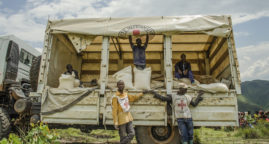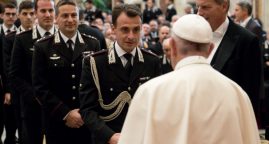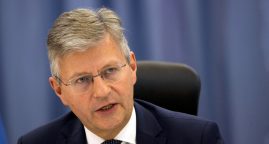Russia leaves Syria talks with tentative plan. Up next: get US involved
Article published on The Christian Science Monitor on 01/24/2017
Russia, Iran, and Turkey agreed Tuesday to sketch the outlines of a wider political settlement to Syria’s civil war, which would be taken to larger talks in Geneva that include the US, the EU, and other major players.
Russia appears to have at least partially succeeded in its bid to kick-start a viable Syrian peace process without the participation of the United States.
But as negotiations between warring Syrian parties, sponsored by the new “troika” of regional powers Russia, Iran, and Turkey, ended Tuesday, no one appeared to be congratulating themselves.
While the results lay the groundwork for more comprehensive talks next month that would involve the US – a key Russian goal – many pitfalls remain, including some rooted within the troika’s individual competing visions for the region.
The two-day meeting took place in the Kazakh capital of Astana, and brought together the Syrian government and some elements of the armed opposition for the first time in five years (though they refused to talk directly to one another). It saw all sides agree to prolong and strengthen a shaky cease-fire established last month, and the creation of a “trilateral commission” – Russia, Iran, and Turkey, to enforce it.
A final statement included pledges to continue the war against irreconcilable jihadist forces such as the Islamic State and Syria’s one-time Al Qaeda affiliate Jabhat Fateh al-Sham (formerly called Jabhat al-Nusra). The signatories also vowed to move forward to sketch outlines of a wider political settlement that could be brought to UN-sponsored talks in Geneva, slated for Feb. 8. Those talks would be attended by major outside powers such as the US, the European Union, and Saudi Arabia.
Neither the rebels nor the Syrian government signed the final statement
“Previous Geneva conferences [on the Syrian war] were a failure. This Astana process was not conceived as a way to circumvent Geneva, but to bring it back on track. It looks like a good partial success,” says Vladimir Sotnikov, a Middle East expert with the official Institute of Oriental Studies in Moscow. “Nobody was expecting a big breakthrough, but there is a solid hope that the Astana meeting could lead to the resumption of real talks.”
For Moscow, the appearance of progress is critical, because one factor underlying its intervention in Syria in September 2015 was a desire to recalibrate its troubled relationship with the US, to win American acceptance of Russia as an indispensable player in forging any Syrian settlement. Despite several hopeful starts over the past year, prospects for a joint US-Russia led peace effort basically crashed and burned amid last fall’s brutal Russian-led assault on rebel-held east Aleppo. But the Kremlin remains keen on a Syrian peace deal with the US involved.
Thanks to an unexpected rapprochement between Russia and Turkey, which had previously backed armed overthrow of Syria’s Assad regime, Moscow was able to put together the “troika” that sponsored the Astana talks, and which might play a strong future role in framing and enforcing a peace settlement.
“It’s clear that the battle for Aleppo changed the equation in crucial ways. It was hard, even cruel, but it created preconditions” for a peace process, says Fyodor Lukyanov, editor of Russia in Global Affairs, a leading Moscow-based foreign policy journal. “The deal with Turkey was another decisive change, because the Turks are able to bring a big part of the militant opposition to a bargaining table.”
A shaky position
For the moment, at least, this puts Moscow in the catbird seat. “Russia is now the leading outside player in search for a settlement in Syria,” says Mr. Sotnikov. But it’s a shaky and perhaps temporary position, he admits.
Syrian government representative Bashar Jaafari hailed the outcome at Astana as a “success,” adding that important obstacles have been overcome. Only a fraction of the hundreds of armed rebel groups in Syria were represented in Astana – mostly those backed by Turkey – but even they complained that the cease-fire was being violated by Syrian forces, and objected strenuously to the Shiite power Iran and its Lebanese Hezbollah allies being named as cease-fire enforcers.
Iran, which has a large military presence in Syria, is opposed to widening the process to include the US or its regional Arab allies such as Saudi Arabia. Russia’s relationship with the other “troika” partner, Turkey, has been so mercurial over the past two years that it does not inspire much long-term confidence, Russian experts say.
They add that no lasting solution for Syria will ever be cemented without the blessing of at least one large Arab state, probably Saudi Arabia. Though demands for the immediate removal of Bashar al-Assad have abated, his continued long-term leadership in Syria remains as bitter a bone of contention as it has been for the past six years.
Much will depend on the attitude of Trump administration, which agreed to send the US ambassador to Kazakhstan to observe the Astana talks after Moscow issued a belated invitation to the US to attend last week.
Related Articles
After Davos, let’s turn talk into action
01/29/2019. Combining humanitarian expertise, local know-how, and private sector acumen could help aid 800 million people around the world
Pope: Protect Civilians During Conflicts
10/28/2017. Audience with Participants in Third Conference on Humanitarian International Law.
INTERVIEW: ‘Our peacekeepers are saving lives every day’ – new UN peacekeeping chief
05/22/2015. More than 3,500 peacekeepers who have lost their lives in the service of peace since UN deployments began in 1948.






